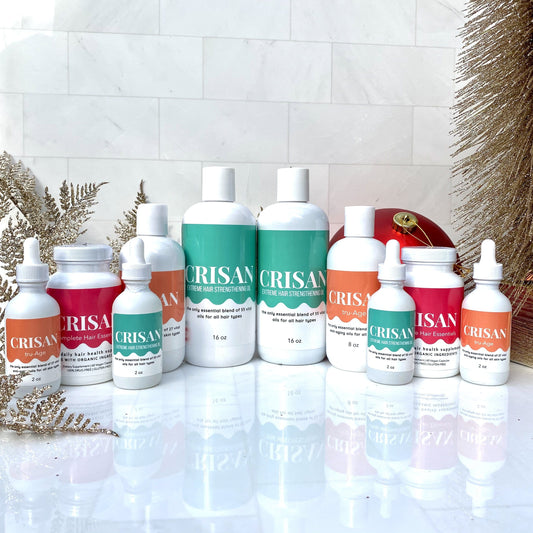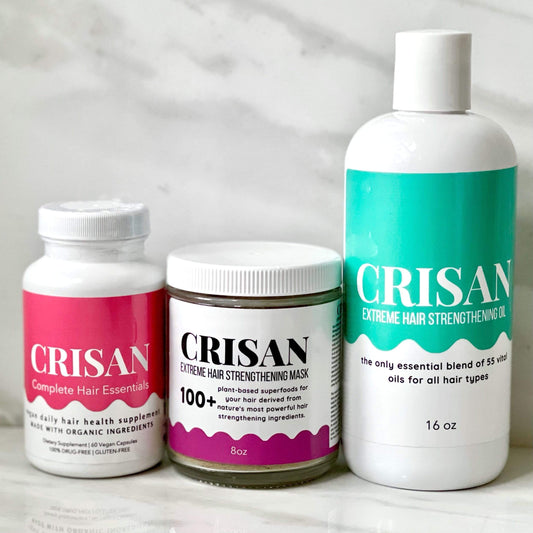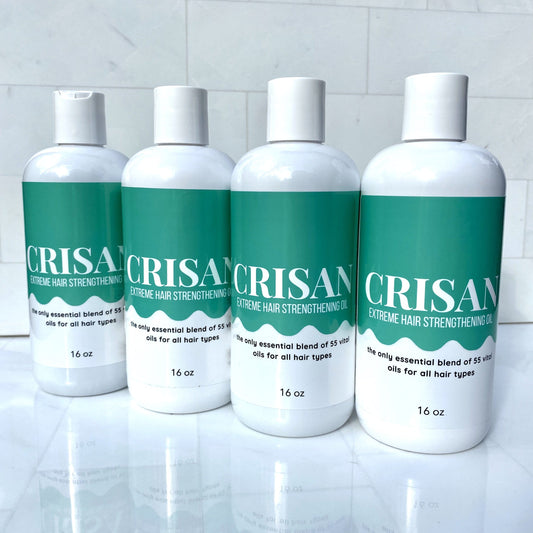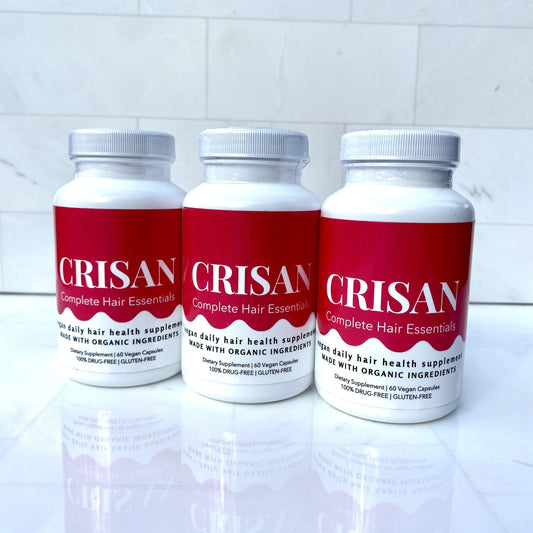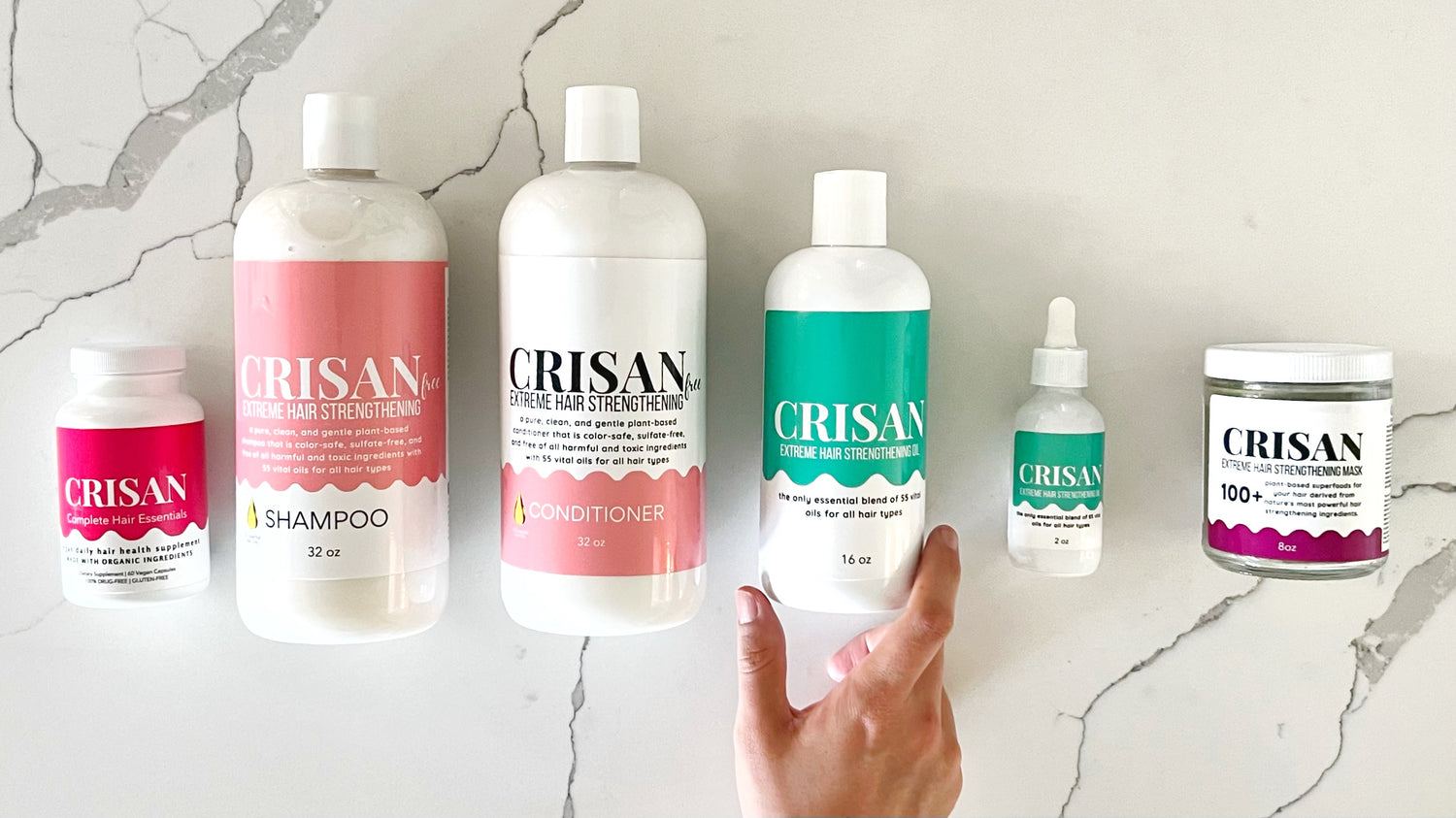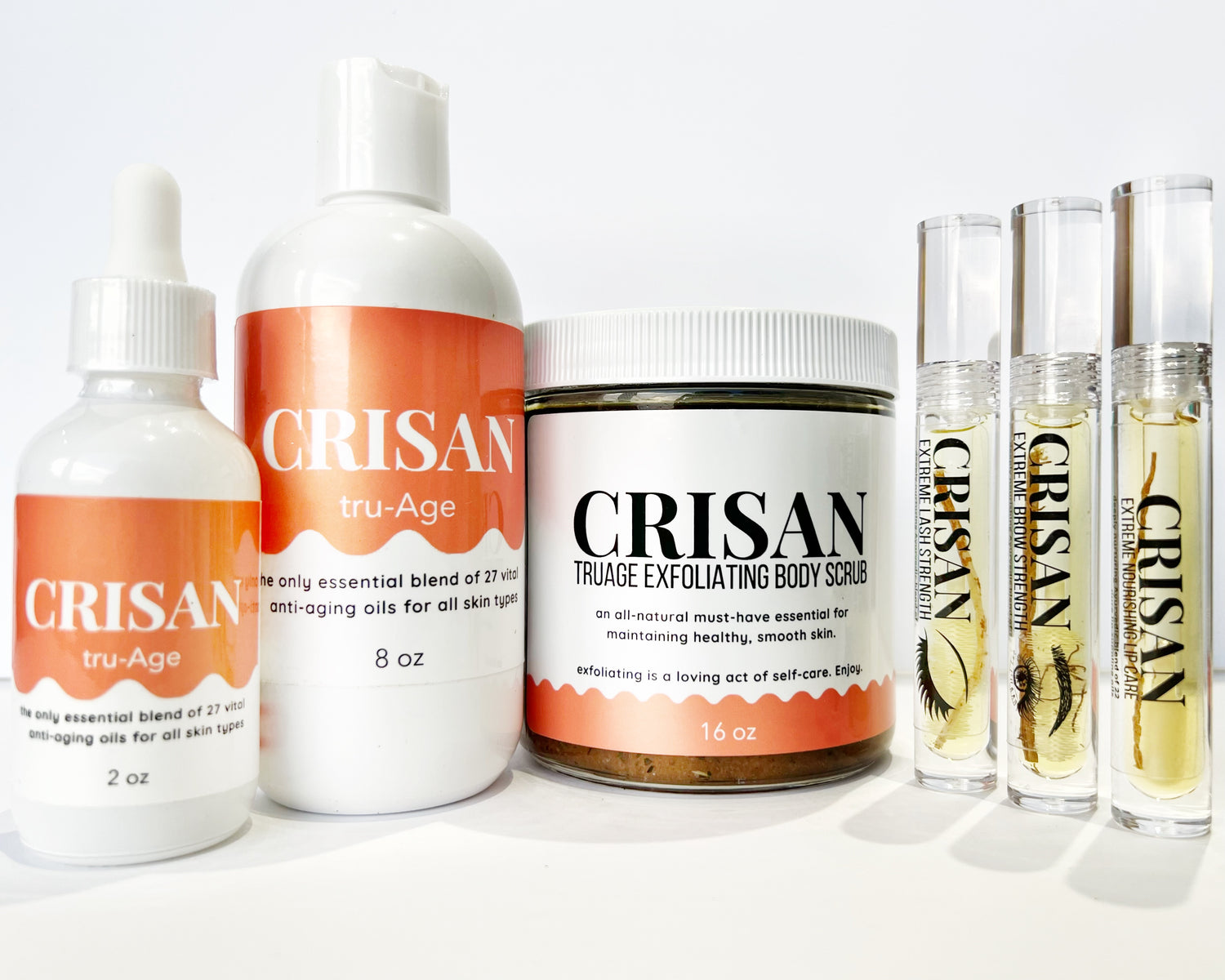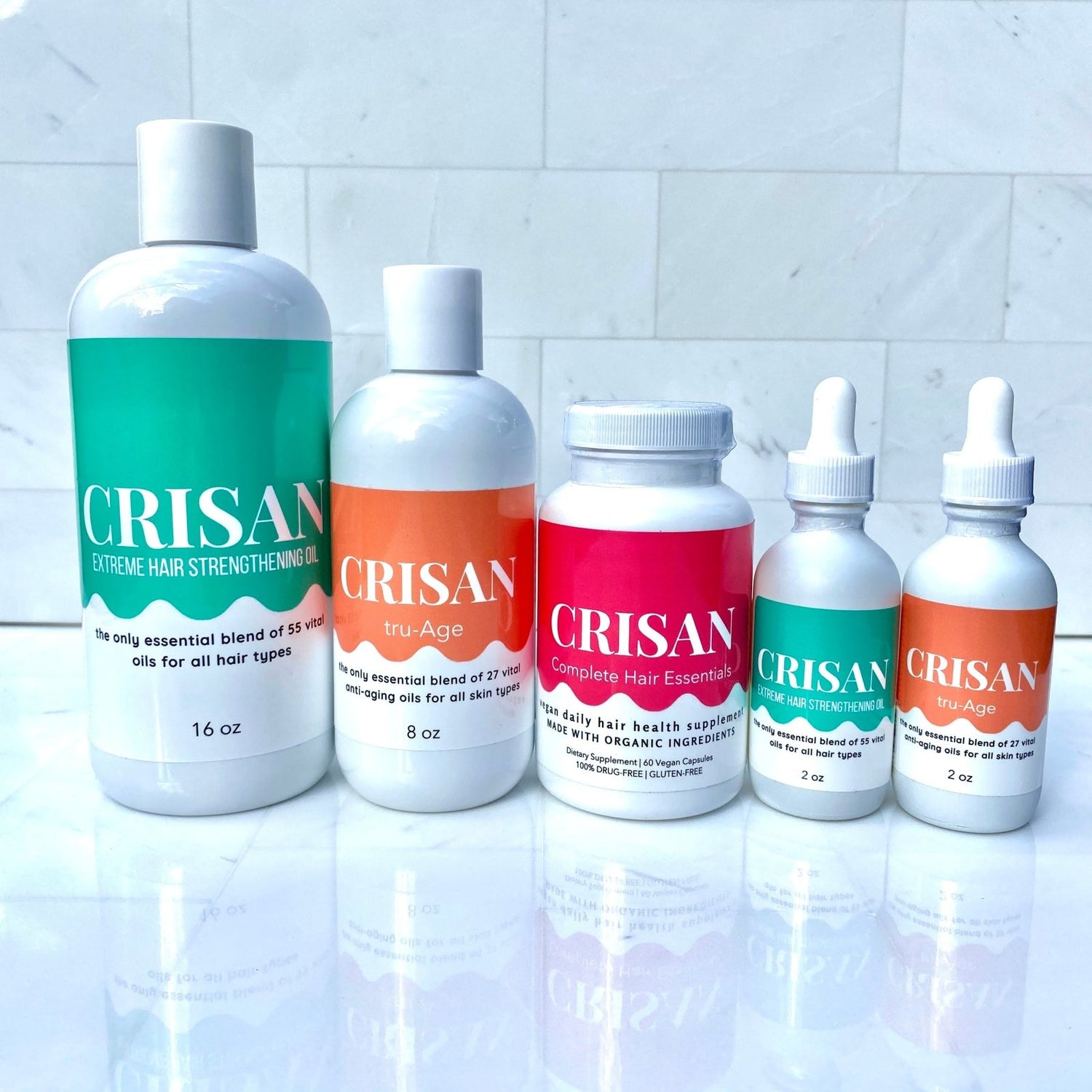A head of hair is often seen as a symbol of health and beauty. If you start to notice your hair thinning, it can be upsetting. But don't worry – there are steps you can take to stop hair loss and encourage new growth.
The best approach to stopping or slowing hair loss is to address the underlying cause. Hair loss can be temporary (telogen effluvium). It can be caused by childbirth, surgery, or another major stressor. Once the problem has passed, your hair will usually regenerate. If you're losing a lot of hair more frequently than usual, see your doctor to rule out any medical issues and explore your choices.
Diet
"Diet" is a term that can easily be misunderstood when it comes to our own personal health. Many see a diet as a restriction put in place to keep weight at bay. At CRISAN, we see our diet as a way of life - not just for weight but for whole health wellness. We eat intentionally - choosing foods that nourish and strengthen us and avoiding foods that make us feel sluggish, unhealthy, or sick. We hope that you can join us in one of our CRISAN Live Group Chats to discuss what it means to eat healthy and how it can differ so much from one person to the next.
Check out these 23 tips to stop hair loss, as well as some answers to frequently asked questions on the subject.
1. Mediterranean diet
A study done in 2018 showed that a diet with raw vegetables and fresh herbs, such as the Mediterranean diet, might diminish the chances of developing androgenic alopecia (female pattern baldness or male pattern baldness) hair loss or at least slow down its arrival.
Consuming large amounts of these food items — for example, parsley, basil, and salad greens — at least three times a week resulted in the best outcomes.
2. Protein
Hair follicles are mostly composed of keratin, a protein. In 2017, one research of 100 people with hair loss discovered several nutritional deficiencies in the participants, including essential amino acids that are required to make protein.
- According to experts, eating a high-protein diet might aid in the prevention of hair loss. Foods that are good for you include dulse, pumpkin seed, hemp seed, lentils & peas, brown rice protein, and some types of collagen
3. Vitamin A
Vitamin A, made up of retinoids in part, promotes healthy hair growth and affects the hair life cycle. But similar to other vitamins, too much or too little harm your locks. You're unlikely to get excess from dieting sources alone though. So increase your intake by eating foods rich in vitamin A like leafy greens, sweet potatoes, and carrots!
Supplements
4. Multivitamin - CRISAN Hair Essentials, Trace Minerals, etc.
The CRISAN Complete Hair Essentials Collection contains many of the most important minerals for hair health. Vitamins A, B, C, and D; iron; selenium; and zinc are important for hair growth and retention, especially during the cell turnover process and are found in this system. You can also try taking a daily multivitamin at your local supermarket or pharmacy or ask your doctor to prescribe one to you.
5. Vitamin D
Vitamin D has been linked to non-scarring alopecia in a 2018 research article. Vitamin D proficiency may help with hair regeneration.
6. Biotin
Biotin, also known as vitamin H or B7, aids in the synthesis of fatty acids. This is essential to the hair life cycle, and a deficiency may lead to hair loss.
7. Saw palmetto
This herb is derived from the fruit of American dwarf pine trees and may aid in testosterone levels. According to a 2020 review of seven studies, saw palmetto doses of 100–320 mg could improve hair quality, count, and density. The researchers suggested that saw palmetto might be beneficial for individuals with AGA, telogen effluvium, and self-perceived hair thinning. Saw Palmetto is one of the many incredible ingredients found in the CRISAN Hair Essentials Collection.
8. Ginseng
Ginseng contains phytochemicals that may promote hair growth on the scalp. There is still much to learn about ginseng dosage recommendations. In the meantime, discuss this with your doctor before taking ginseng supplements.
Hair care
9. Wash Regularly According to Your Hair Type
To maintain a healthy scalp and protect against hair loss, shampoo your hair as often as needed using a mild formulation. Harsher shampoos can damage the scalp by drying it out and causing breakage.
10. CRISAN Hair Oil
The CRISAN Hair Oil also contains a blend of 55 essential oils that nourish the scalp and promote hair growth. Apply the CRISAN Hair Oil as liberally as needed and leave it in for 30 minutes or longer (even overnight). Wash out with your regular shampoo and conditioner for complete hair restoration.
11. Olive oil
Not only is olive oil great for your hair, but it can also help slow down genetic hair loss.
Before shampooing your hair, apply 2-3 tablespoons of olive oil to it and let the oil sit for 30 minutes. Then wash the oil out thoroughly.
12. Style Gently
Avoid tight braids or ponytails that may tug on hair at the root and cause excessive shedding. Let your hair dry naturally to avoid aggravating your scalp. Avoid heat stylers, especially curling and straightening irons, since they can damage or break the hair shaft.
13. Hair processing
Chemical-based treatments, such as perms or hair color, can cause damage to both hair and scalp. Speak with your stylist about alternative options that are available, like organic dyes or those without ammonia, peroxide, or para-phenylenediamine (PPD).
Medical treatments
14. Low-Level Laser therapy
Low-level lasers may aid in the improvement of hair density for people with hereditary hair loss or chemotherapy-induced loss. This method is also known as red light therapy, and it works by stimulating epidermal stem cells. Home laser devices are available on the market. And to see results, you'll need to use the device on a regular basis.
15. Platelet-rich plasma hair injection

By injecting platelet-rich plasma (PRP) into the scalp, individuals can help stimulate growth in areas already impacted by hair loss. Blood is first run through a centrifuge to separate the platelets before being injected into the scalp.
One study conducted in 2014 found that 11 participants saw 30% more growth in thinning areas after only four sessions! Though this method may be costly, pricing typically ranges from $1,500 to $3,500 for your first three treatments--and it's unlikely to be covered by insurance.
Medications
16. Minoxidil
This over-the-counter (OTC) medication, often known as Rogaine, is a hair loss treatment. Each day, use the solution or foam on your scalp. Scalp irritation and acne at the site of application are two common side effects. Unfortunately, to maintain growth, a user must apply regularly for the rest of his or her life. More serious side effects such as irregular heartbeat and poor eyesight may occur - although rare.
17. Finasteride
This prescription pill (Propecia) has been known to slow hair loss and promote new growth. However, you must be willing to use the medication for up to 12 months to see any results. Additionally, various side effects come with this pill- such as a loss of libido or erectile dysfunction. If you are pregnant or may become pregnant in the future, it is best to avoid this type of medication altogether.
18. Phenylephrine
Topical phenylephrine, or AB-102, has not yet been released to the public. Its developers have high hopes for it though, as it is shown to possibly help with hair loss caused by styling. The way it does this is by stimulating the follicle muscles to contract. This makes it harder for hairs to be pulled out during brushing or other activities.
19. Essential oils
Essential oils might assist in the reduction of hair loss. Various essential oils, such as chamomile oil, thyme oil, tea tree oil, and others, have been shown to improve issues including alopecia areata, androgenetic alopecia, and psoriatic alopecia. Lavender, lemongrass, and peppermint are other important essential oils to consider. The CRISAN Hair Oil (mentioned above), is a combination of 55 essential oils as well as carrier oils and has a 5-star rating on Google Reviews from over 1000 reviewers.
20. Onion juice
After applying crude onion juice to their scalps twice a day, people with alopecia areata may experience regrowth. While there is little study on this therapy, the juice appears to have encouraged growth in almost 87% of participants in a small 2014 trial. Scientists think that the sulfur content of the onion may play a role in hair-growth properties.
21. Massage
Massaging your scalp not only feels good, but it also might help make your hair grow. A small study from 2016 demonstrated that people who massaged their scalps for just 4 minutes a day saw results after 24 weeks.
22. Yoga
Hair loss caused by stress might be prevented or slowed with yoga. Try one of the following stress-relieving yoga postures to prevent and slow hair loss: downward dog, forward bend, camel pose, shoulder stand, fish position, or kneeling posture.
23. Inversion Method
Use one of the most ancient natural techniques for hair growth on the planet - the Inversion Method! The inversion method is supposed to aid in growing your hair an extra inch each month. Proponents of the technique believe that hanging your head upside down improves blood flow to the scalp, which promotes hair development. Doing a handstand, headstand, or utilizing an inversion table are some approaches suggested.
What are the causes of hair loss?

Your hair goes through a predictable pattern of growth, shedding, and resting. Most people lose approximately 100 hairs per day. Sudden loss, especially in patches or thinning overall may require medical attention from your doctor to diagnose the underlying condition causing the excessive hair shedding. Some types of temporary shedding respond well to dietary changes while others are more permanent and do not stop until an underlying condition is treated.
Hereditary hair loss, including androgenic alopecia (or male and female pattern baldness), affects nearly 50 percent of men and 15% of women.
Hair loss can also be caused by:
Medical conditions including alopecia areata
Scalp infections
Trichotillomania (hair-pulling disorder)
Hormonal changes ranging from pregnancy to menopause
Thyroid troubles
Medications or supplements used for cancer treatment as well as high blood pressure
Depression
Arthritis
Radiation therapy for malignancies
Stress both physical and emotional
Hairstyling methods such as wearing tight ponytails or cornrows.
FAQs
Is hair loss permanent?

Some causes of hair loss are temporary, but others can cause permanent damage to your hair follicles, resulting in irreversible hair loss. Permanent hair loss is the result of progressive damage done to the structure within your skin that houses and grows individual strands of hair: the hair follicle. Conditions that may lead to permanent hair loss include:
- scarring or cicatricial alopecia (when inflammation destroys hair follicles)
- trichotillomania (an irresistible urge to pull out one's hair)
- traction alopecia(which occurs when hairstyles like braids pull too tightly on hair.)
Do hot showers cause hair loss?
Extremely hot water can break down keratin, the substance that makes up hair strands. It might also remove natural oils like sebum from your scalp and hair, causing dryness and inflammation.
Overwashing your hair, especially with hot water, can lead to breakage. To maintain healthy strands, wash with cool or lukewarm water and avoid brushing or stretching wet hair. Finger-comb your hair with conditioner when you are in the shower to help remove tangles. Additionally, use a deep conditioner regularly.
Does caffeine stop hair loss?
Some research suggests that caffeine might help with hair growth and loss prevention. A 2007 study found that when tested on male subjects, caffeine blocked the hormone dihydrotestosterone (DHT) from causing hair follicle loss—a problem all genders face. The caffeinated rinse also widened each subject's hair root width while prolonging the full growth phase of their hairs. When female subjects were given the same test, it was shown to have comparable growing effects on their scalps as well. Caffeine is known as a vasodilator, meaning that one of its properties is opening blood vessels wide: this may be how it helps improve blood flow to the scalp and sustainably promote hair growth over time. You can make a do-it-yourself coffee or green tea rinse at home for fresh healthy locks!
Can stress cause hair loss?
Yes, psychological stress can cause hair loss in a variety of ways and might induce the following:
Alopecia Areata
Alopecia areata is an autoimmune disease in which the immune system attacks the hair follicles. Hair loss on the scalp occurs as a result of alopecia areata.
Alopecia Universalis
A more severe form of alopecia, causes total body hair loss.
Telogen effluvium
This condition causes an increase in hair follicle dormant stages (telogen).
Trichotillomania (hair-pulling disorder)
This term refers to when someone pulls their hair out impulsively or compulsively due to emotional distress or mental illness.
Do hair transplants help hair loss?
Transplants are the process of transplanting hair from one region of the scalp to another. Depending on the cause of hair loss, transplants might be successful for some individuals. However, you'll need sufficient donor hair and will have to wait several months before your new hairs develop. 10% to 80% of transplanted hair may return in 3 to 4 months after transplantation. To determine if a hair transplant is appropriate for you, talk with a dermatologist or a hair restoration expert.
Does smoking cause hair loss?
Not only does smoking damage your health, but it may also lead to hair loss. In 2020, a study of 500 smokers and 500 non-smokers found that smoking correlates with an increased likelihood of hair loss. The chemicals in nicotine might be involved in accelerated hair loss, but more research is needed for confirmation. Additionally, smoking creates more free radicals—molecules that react with others and can harm cellular DNA (a process known as oxidative stress).
The takeaway
If you're worried about hair loss, have a conversation with your doctor. They can help identify any health conditions that might be causing it and come up with a treatment plan.
While sudden or severe hair loss can be startling, there are often easy solutions. By addressing the root cause and making some adjustments to your lifestyle, it may be possible to stop or prevent hair loss altogether.






